Jessica Miller: “At 22, I was called an ‘old model,’ which was nice for my self-esteem”
After almost three decades in fashion, the 40-year-old looks back on her career and life, including her marriage to Metallica drummer Lars Ulrich
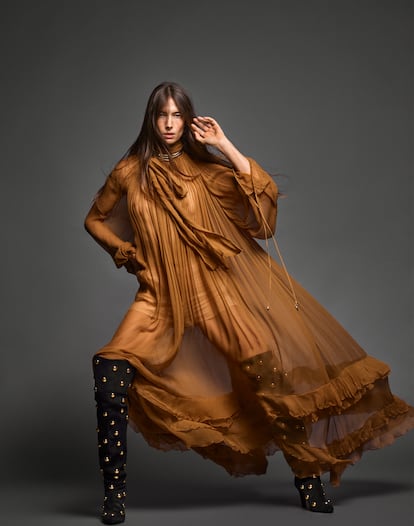
“Getting older is a gift,” says Jessica Miller, reflecting on what it means to still be working as a model at 40 after having worked for brands such as Chanel and Marc Jacobs.
Miller — who was born in Las Vegas, Nevada — is the face of Chloé’s New Era, led by its new creative director, Chemena Kamali. It’s an opportunity she considers one of the greatest honors of her career.
When her agency asks her for recent photographs, she has extra help at home: her husband, Lars Ulrich, drummer and co-founder of the iconic heavy metal band Metallica, who takes the snapshots.
“I’ve never felt that before with anyone, not even with family: it’s unconditional love. Yesterday he took a ferry to come here, he brought all my bags… He’s the sweetest man in the world! We have been married for almost 10 years and I love him even more now, because we have been through a lot,” she says with a sparkle in her eyes.
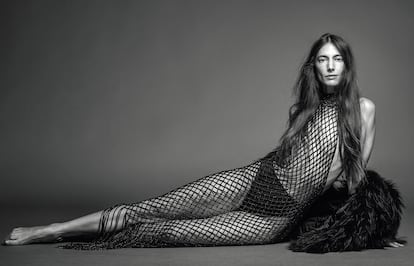
Question. You have just turned 40, and you are still working for the fashion giants. Do you feel that you are an exception, or that is this becoming more and more common?
Answer. At 22, I was called an “old model,” which was nice for my self-esteem… I would say that I enjoy the fashion industry a lot more now that I’m older because I feel more and more confident. I know that I’m very lucky to have the job that I have, but it’s not as easy a job as people think. At 14, I had to learn to travel constantly and work with new people every day, so it was hard for me to appreciate the creativity of the job and the clothes because I struggled to adapt to the logistics of being a model and having the right tools to emotionally deal with it. Now I can see how blessed I am and I know how to deal with the ups and downs in a healthier way.
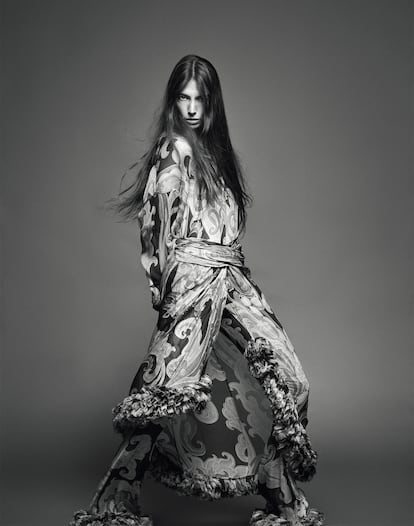
Q. You were called an “old model” at 22, but before that, you were called “fat”…
A. That’s a thing that I struggle with still a little bit. When the #MeToo movement came about, I was asked a lot about stories of abuse, but the truth is that I’ve only had bad stories with women. When I was 16, in Paris, a stylist told me to my face: “You’re fat.” I feel that thanks to this movement, the fashion industry is kinder. For example, I notice that models now celebrate each other a lot more, something I didn’t experience when I was 20. But we’re human, so we’re always going to be terrible to each other.
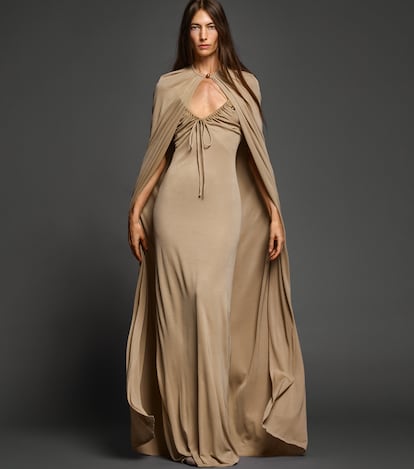
Q. After hearing phrases like that, do you have a healthy relationship with food?
A. It’s definitely something I’ve struggled with, as most women have too. During this photo shoot, I had something on that was particularly tight, and I realized that if I had been faced with a situation like this 10 years ago, I would have been very upset. When I became vegan, I gained weight from eating fake burgers that, although they have no cholesterol, are high in fat, and it was when I started doing therapy that I realized that I had to eat what really made me feel good. I used to be in the gym every day, but it was something I didn’t like. Now I feel fit and healthy. When I exercise, I don’t think about calories. I don’t train anymore: I move. It’s not a struggle anymore. I used to torture myself, and now it all seems easier.
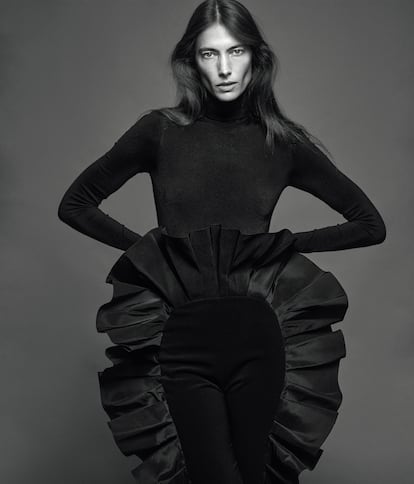
Q. And does getting older bother you?
A. No, and I thought that it would. I was happy to turn 40 in February. I love my job, my husband, my family… There is so much to be grateful for that I don’t worry about age, because aging is a journey. I didn’t feel that way before, so I guess it’s because of the work I’ve done in therapy. I know how to set boundaries now. Plus, I think the fashion industry is starting to celebrate age.
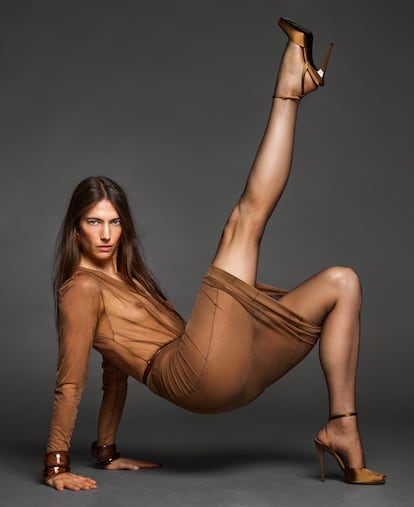
Q. Do you think diversity is more of a marketing tool?
A. I have never seen diversity in the fashion world when it comes to sizes. Although fortunately there are now models of different sizes, I don’t think that everyone can gain weight whenever they want. In fact, I don’t know if I would work as much as I do if I gained five kilos. Although I have to applaud the way the industry is starting to celebrate age, I think that in terms of weight, there is still a lot to do.
Q. Did you feel pressure being the first model to sign an exclusive contract with Calvin Klein after Kate Moss?
A. I remember riding the subway and knowing that my life was going to change. I felt like what I had worked for was finally paying off. It was an iconic campaign. My dad always thought modeling was pointless, but when I signed that contract and there was an article in The New York Times, he said, “Now you have a real job!” Inez & Vinoodh, who I now consider my aunt and uncle, were the photographers, and I learned how to model by working with them. On the shoot, I also worked with the choreographer Stephen Galloway, and I really came into my body. It put extra pressure on my career, so the highs and lows were much higher and much lower, but I feel Iike those ads is when I like really came into my body and taught me how to be a good model.
Q. What did it feel like to attend your first Metallica concert, when you were 12 years old?
A. My mom took me to the show because I was a huge fan of the band, and since we were so far away from the stage, we had binoculars. My friends and I loved Metallica, which is crazy when you look at it from the present. Every now and then, I’ll watch my husband play and think, “What the hell is going on here? I was a fan of the band!” I spent every day of my 13 years listening to the Master of Puppets album. There are times when I’ll watch them play and say, “Did I marry Lars?”
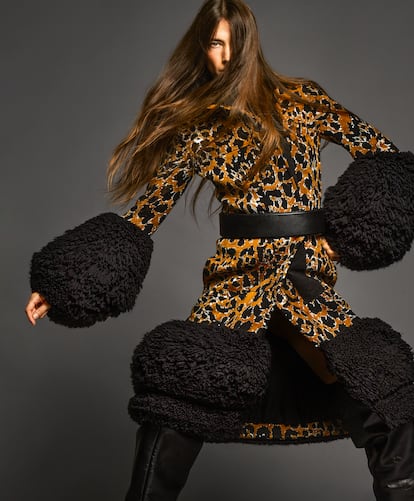
Q. But it wasn’t love at first sight, was it?
A. We were in a relationship! We were friends. I remember always being shocked by how nice he was, but I was so in love with my boyfriend. I met Lars at a concert when I was newly single. He appeared out of nowhere, came up to me, and I saw him in a different way. He’s such an incredible partner.
Q. Would he say that you are his muse, a somewhat controversial term?
A. I’ve never heard him say it. I think we balance each other out. He wakes up and can make calls, while I have to have my coffee and clear my head. Even though we’re opposites, we balance each other out, and when things get crazy, he helps me look at things from a different angle. I’ve heard him say something similar from a business perspective or creatively, but I’ve yet to hear him say that I’m his muse… I’ll have to ask him!
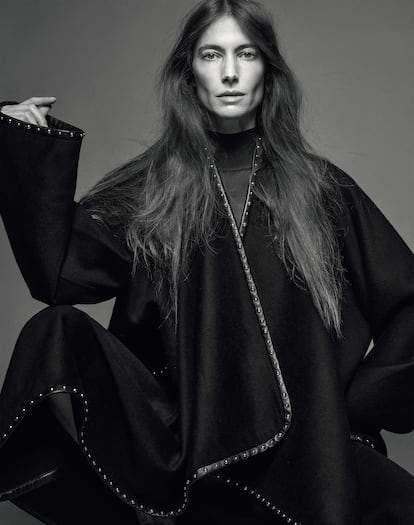
Q. Why do you think it’s so common for models to end up with musicians?
A. I can’t imagine dating someone who doesn’t travel for work or have the ability to work in remote locations because it’s hard. I guess understanding each other’s schedules is essential. Travel is amazing; we’re both dedicated to our jobs and we’re aware that when we travel we’re traveling for work, but I think it can be hard to be in a relationship with someone who’s waiting for you at home. I can imagine how stressed that person might get thinking about what the other person might be doing. Lars and I have always understood each other because the nature of our jobs is similar in some ways.
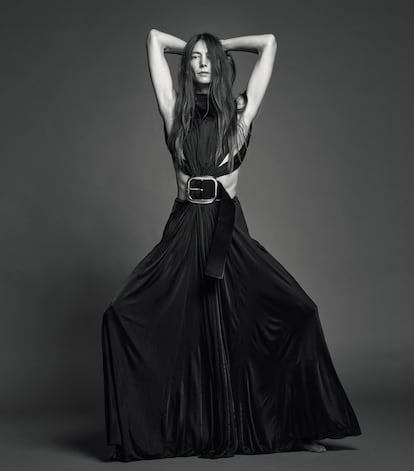
Q. You have said that your parents had problems with addictions, but you always speak positively about your childhood. Why?
A. They both tried to do the best they could and thankfully there was no abuse whatsoever, but they weren’t always present. I have an older sister and a younger sister, so we were always together. One time, my father was driving under the influence and we were in the car with him. We got pulled over by the police and because my mother was out, we were sent to an orphanage for two nights. I’ve always known they loved us and now I feel sorry for them. When we couldn’t wake my father because he had too much to drink, we had each other. I can’t imagine what it would have been like to go through that alone. My father had a liver transplant in 2010, and I put my life on hold for a year. He now has more energy than anyone else.
Q. And then you got into fashion, where addictions are the order of the day, and ended up with a musician…
A. With so much traveling and meeting so many people every day, alcohol, which is everywhere, became an easy tool to get out of it all. Drinking became an excuse and although I would never hope for Covid, it happened just when I was at a point where I was sick of self-medicating. I knew I didn’t want to drink that way. I struggled with alcohol and in 2020 I started going to therapy. There was a point where I was seeing three different therapists at once. The one I saw daily, which I still see today, I felt like I needed another specialist to delve into the traumas and help me feel them in my body, and then I had a DBT [Dialectical Behavioral Therapy] therapist, with whom I analyzed how I communicated with people and who helped me to have healthy conversations.
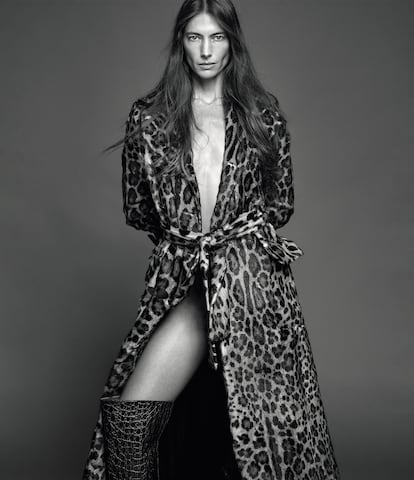
Q. You’re on the board of directors of the farm animal sanctuary Animal Place, do you think the world will go vegan?
A. I volunteered with them seven years ago and they have changed my life. Being able to work with farm animals has helped me understand humans in a more organic way. I feel like I am kinder and more willing to listen. Vegans will kill me for saying this, but I think we are not made to be vegan. What I wonder is if the climate situation will force us to end the commitment to farm animals. I am completely vegan and I do not buy leather, but if I were in the middle of nowhere and starving, I would eat meat. We are made to survive. I have never said that I am the perfect vegan, and if I refused to wear leather in photos, I don’t think I would work. I love my job too much and I think I am doing the best I can.
Q. What do you think of Chemena Kamali’s work at Chloé?
A. Her passion is contagious. After her first show at the helm of the brand last February, she and her team burst into tears of joy, something I had never seen before during my career. That says a lot about what Chemena feels and evokes. I feel like I am part of something personal when I wear her designs.
Team
Sign up for our weekly newsletter to get more English-language news coverage from EL PAÍS USA Edition
Tu suscripción se está usando en otro dispositivo
¿Quieres añadir otro usuario a tu suscripción?
Si continúas leyendo en este dispositivo, no se podrá leer en el otro.
FlechaTu suscripción se está usando en otro dispositivo y solo puedes acceder a EL PAÍS desde un dispositivo a la vez.
Si quieres compartir tu cuenta, cambia tu suscripción a la modalidad Premium, así podrás añadir otro usuario. Cada uno accederá con su propia cuenta de email, lo que os permitirá personalizar vuestra experiencia en EL PAÍS.
¿Tienes una suscripción de empresa? Accede aquí para contratar más cuentas.
En el caso de no saber quién está usando tu cuenta, te recomendamos cambiar tu contraseña aquí.
Si decides continuar compartiendo tu cuenta, este mensaje se mostrará en tu dispositivo y en el de la otra persona que está usando tu cuenta de forma indefinida, afectando a tu experiencia de lectura. Puedes consultar aquí los términos y condiciones de la suscripción digital.









































